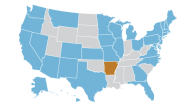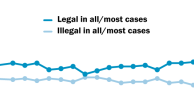By Richard Wike, Associate Director, Pew Global Attitudes Project
Europeans generally reacted to President Obama’s re-election with a mixture of excitement and relief, just as they did four years ago.For many across the Atlantic, Obama’s 2008 victory signaled the end of the Bush-era estrangement between the U.S. and its Western allies, and the emergence of an America that would see the world a lot like Europeans do.However, despite Obama’s re-election at home and continued popularity in Europe, his presidency has not closed the long-running transatlantic values gap.Instead, on issues such as the use of military force, religion, and individualism, Americans and Europeans continue to disagree.
Obama has been popular in Europe since he toured the Continent as a presidential contender. Following George W. Bush’s two terms in office, Europeans immediately embraced Obama’s presidency.A stunning 93% of Germans expressed confidence in Obama in the early months of his first term, compared with just 14% for Bush during his final year in office.In Britain, France, and Spain, the new American president also received stratospheric ratings.
The result was a dramatic “Obama effect” on attitudes toward the U.S.In France, for instance, America’s favorability rating soared from 42% in 2008 to 75% in 2009.And importantly, support for American policies grew, especially support for U.S. anti-terrorism efforts.The enthusiasm that greeted Obama’s election has waned a bit over time, even in Europe, but vestiges of “Obamamania” remain.The 2012 Pew Global Attitudes survey found at least eight-in-ten expressing confidence in the U.S. president in Germany, France, and Britain.
However, while the pervasive anti-Americanism of the Bush years has receded, the “values gap” between Americans and Europeans is alive and well.Polls consistently find a transatlantic divide when it comes to fundamental beliefs on a variety of political and cultural issues.Americans and Europeans view each other with less hostility today, but they still don’t see the world in the same way.
Take the issue of military force.Americans remain more inclined than Europeans to say it’s necessary to use military force to maintain order in the world.Meanwhile, they are significantly less likely than Europeans to believe that getting UN approval is necessary before using military force to deal with international threats.America’s willingness to “go it alone” in world affairs has become an ingrained piece of the country’s international image – and it hasn’t changed much in the Obama years.Majorities across Europe continue to see the U.S. as acting unilaterally, not taking into account the interests of other nations when making foreign policy.
The Obama administration’s use of drone strikes illustrates the divide over hard power.About six-in-ten Americans – including majorities of Republicans, Democrats, and independents – approve of U.S. drone attacks against extremist leaders and organizations in countries such as Pakistan, Yemen, and Somalia.But in seven of the eight EU nations surveyed by Pew in 2012, more than half oppose these strikes, including nine-in-ten Greeks and 76% in Spain.The lone exception is the British, who are almost evenly divided on this issue.
Religion is another topic where Americans and Europeans hold very different views.In largely secular Western European nations such as Spain, Germany, Britain, and France, less than a quarter consider religion very important to their lives.Even in Poland, where Catholicism still plays an important role in public life, only 27% say religion is very important.By contrast, fully half of Americans hold this view.Similarly, solid majorities in the six EU nations surveyed by Pew in 2011 said you do not have to believe in God to be a moral person, but only 46% of Americans felt this way.
The same 2011 poll asked Christians from the U.S. and eight European nations whether they identify first with their nationality or their religion.Americans were evenly split: 46% said they think of themselves first as Americans and 46% as Christians.In seven of the eight European countries, a majority of Christians identified primarily with their nationality.Only 8% of French Christians, for example, said they thought of themselves first as Christians.
Individualism also continues to differentiate Americans and Europeans.Most Americans believe individuals largely control their own fate – just 36% agree with the statement “Success in life is pretty much determined by forces outside our control.”However, half or more in Germany, France, and Spain agree with this statement.
Europeans also believe in a very different relationship between the individual and the state.When asked which is more important, that everyone be free to pursue life’s goals without interference from the state, or that the state play an active role in society to guarantee that no one is in need, 58% of Americans choose the former.Majorities across Western and Eastern Europe, on the other hand, say making sure no one is in need should be a bigger priority.
Of course, even on fundamental values like these, opinions can and do shift over time, and on a few key issues, the values gap is shrinking.For instance, Americans are not as convinced as they used to be about their own cultural superiority – in 2002, six-in-ten agreed with the statement “our people are not perfect, but our culture is superior.”By 2011, just 49% held this view, much closer to the levels typically registered in Europe.
Public opinion on homosexuality has also shifted dramatically.The percentage of Americans saying society should accept homosexuality rose from 49% in 2007 to 60% just four years later.This is still much lower than the high levels of acceptance witnessed in Europe – more than eight-in-ten in Spain, Germany, France, and Britain believe homosexuality should be accepted – but the gap is clearly closing.The recent passage of marriage equality ballot initiatives in four U.S. states highlights how quickly public opinion on this issue is changing.
Moreover, young Americans increasingly look like their cohorts across the Atlantic on these questions.Nearly seven-in-ten Americans under age 30 say homosexuality should be accepted and only 37% think their culture is superior to others.Young people are also much more likely than older Americans to believe the government should make sure no one is in need.If these trends continue and expand to other topics, the transatlantic values gap could someday vanish.But for the foreseeable future, the divide will likely persist, regardless of who occupies the White House.




